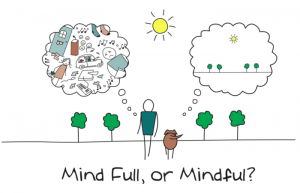
While tests and tougher standards are making school more stressful than ever for students, it is good to know that a coping mechanism is emerging to counteract this trend – mindfulness is being introduced by more and more schools to help their students, especially during exam time.
The increased stress students feel is very real. An indicator of this is that 3,077 students called the charity helpline ChildLine last year saying they were stressed about exams. This is an almost 10% rise from the previous year. When you factor in the fact that only a small number of students probably use the helpline, it gives an idea of the extent of the problem.
The non-profit Mindfulness in Schools Project has been one of the frontrunners of bringing the practice into schools through its .b (Stop, Breathe and Be) 10-week programme for 11-18 year olds. However, the question on most minds is “What is mindfulness?”. According to the Oxford English Dictionary it is “the state or quality of being mindful”. A more helpful definition is the meaning of the word as part of Buddhist philosophy: “the meditative state of being both fully aware of the moment and of being self-conscious of and attentive to this awareness; a state of intense concentration on one’s own thought processes; self-awareness”. However, according to the same dictionary, the term’s usage is now weakened. It has become a jargon word for everything from weight loss to bringing down blood pressure (The NHS calls it one of the 5 steps to wellbeing http://www.nhs.uk/conditions/stress-anxiety-depression/pages/mindfulness.aspx).

Mindfulness for students helps them to not only do well in exams, but also to focus in the classroom. It helps with general stress relief, especially before and during high-stakes testing. A student quoted in an article says going into an examination after practising mindfulness regularly made it ‘100 times better’. A small study also showed that mindfulness improved concentration in students. However, it has its critics. Some students said it makes them feel sleepy and tired. A blogger on health research, Andre Tomlin, says it has not had enough robust testing, so there is no evidence that it makes any difference.
Whatever one might think about mindfulness, there seems to be a widely accepted view that it is beneficial, especially in dealing with stress. I am pleased to see that educators are broadening their horizons about what works, recognising that our minds and bodies are linked. We need more creative solutions to school stress, giving our students the tools they will need to be healthy and productive in an increasingly competitive world – one that looks like it might only become more so.
Have you tried mindfulness? Would you like to try it? Perhaps you think it is a lot of mumbo-jumbo and has no place in a Western state school? Whatever your views are, let me know and we can start an interesting discussion.